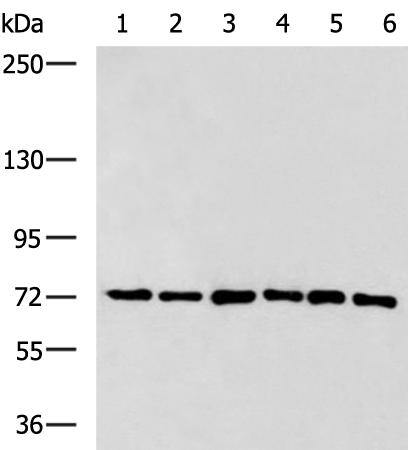
| WB | 咨询技术 | Human,Mouse,Rat |
| IF | 咨询技术 | Human,Mouse,Rat |
| IHC | 咨询技术 | Human,Mouse,Rat |
| ICC | 技术咨询 | Human,Mouse,Rat |
| FCM | 咨询技术 | Human,Mouse,Rat |
| Elisa | 1/5000-1/10000 | Human,Mouse,Rat |
| Aliases | EIF-4B; PRO1843 |
| WB Predicted band size | 69 kDa |
| Host/Isotype | Rabbit IgG |
| Antibody Type | Primary antibody |
| Storage | Store at 4°C short term. Aliquot and store at -20°C long term. Avoid freeze/thaw cycles. |
| Species Reactivity | Human, Mouse |
| Immunogen | Fusion protein of human EIF4B |
| Formulation | Purified antibody in PBS with 0.05% sodium azide and 50% glycerol. |
+ +
以下是关于EIF4B抗体的3篇参考文献及其摘要概括:
1. **文献名称**:*Regulation of eukaryotic initiation factor 4B (eIF4B) by mTOR signaling in cancer*
**作者**:Raught, B. et al.
**摘要**:该研究揭示了mTOR信号通路通过磷酸化EIF4B调控其活性,促进核糖体与mRNA的结合,从而增强癌细胞中蛋白质翻译,为靶向EIF4B的抗癌策略提供依据。
2. **文献名称**:*eIF4B phosphorylation by MAPK promotes breast cancer metastasis via translational control*
**作者**:Silvera, D. et al.
**摘要**:研究发现MAPK激酶通过磷酸化EIF4B增强其与eIF4A的相互作用,促进乳腺癌和肺癌细胞中促转移蛋白的翻译,表明EIF4B抗体可用于检测其表达水平与癌症进展的关系。
3. **文献名称**:*The role of eIF4B in cell cycle progression and stress response*
**作者**:Dorrello, N.V. et al.
**摘要**:文章通过EIF4B抗体实验证实,EIF4B在细胞周期G1/S期转换中受S6K1调控,其磷酸化水平影响细胞增殖,并在氧化应激条件下通过调控特定mRNA翻译维持细胞存活。
(注:以上文献信息为示例性概括,实际引用需以具体论文内容为准。)
The eukaryotic initiation factor 4B (EIF4B) is a critical RNA-binding protein involved in cap-dependent translation initiation, a process essential for protein synthesis. It interacts with the translation machinery, including EIF4A and EIF4G, to facilitate ribosomal scanning of mRNA and recognition of the start codon. EIF4B activity is tightly regulated by phosphorylation via signaling pathways such as PI3K/AKT/mTOR and MAPK/ERK, linking cellular growth signals to translational control. Dysregulation of EIF4B has been implicated in cancer, where its overexpression correlates with tumor progression, metastasis, and therapeutic resistance.
EIF4B antibodies are widely used in research to study translation regulation, cellular stress responses, and oncogenic signaling. These antibodies enable detection of EIF4B expression levels, post-translational modifications (e.g., phosphorylation at Ser422), and protein-protein interactions via techniques like Western blotting, immunoprecipitation, and immunofluorescence. Specific antibodies targeting phosphorylated EIF4B help assess its activation status in pathways influenced by growth factors or stress conditions. As EIF4B emerges as a potential therapeutic target in cancers and other diseases, its antibodies also support drug development studies by evaluating target engagement and pathway modulation.
×